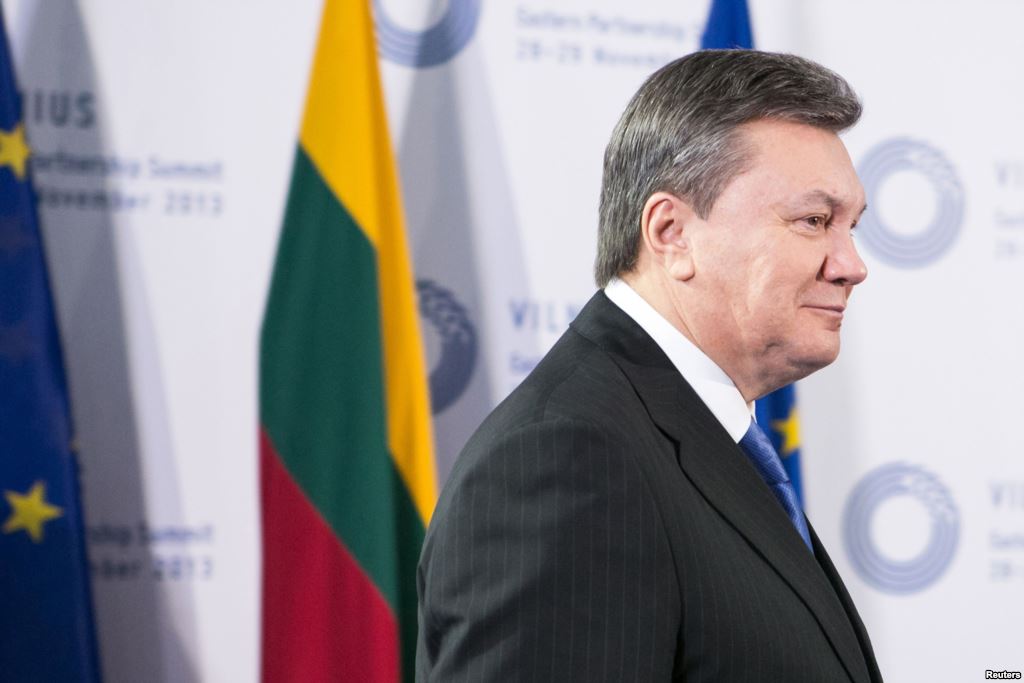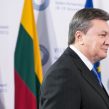
Ukraine and the European Union at the Vilnius Summit and in Its Aftermath (Part Two)
Publication: Eurasia Daily Monitor Volume: 10 Issue: 217
By:

Russia has temporarily derailed the European Union–Ukraine Association Agreement (AA) and Deep and Comprehensive Free Trade Area (DCFTA) deal at the EU’s Vilnius summit, November 28–29. Moscow achieved this success through economic pressures on Ukraine and threats to escalate such pressures, which the EU could not mitigate (see Part One, EDM, December 3). This is the latest in a series of Russian geopolitical and economic gains against Western interests in Europe and nearby theaters in recent months.
The EU had expected to initial the AA and DCFTA with Armenia at the Vilnius summit, and sign those agreements in 2014 to bring them fully into effect. Ahead of the Vilnius summit, however, under pressure from the Kremlin, Yerevan turned around, renouncing the nearly-completed agreements with the EU and choosing the Russia-led Customs Union/Eurasian bloc instead (see EDM, September 5, 6, 11, 18). Four EU member countries (and several aspirant states) have recently confirmed their accession to Gazprom’s South Stream project, contravening EU legislation and policy, after the EU’s failure to finance the Nabucco project. The setback in Ukraine is potentially of even greater magnitude, but can still be reversed if the EU acts politically to halt the collapse of order in Kyiv.
Russia skillfully timed its attack on Ukraine’s economy to the run-up of the Vilnius summit. Moscow counted on the EU’s cumbersome policy-making process to react too slowly to salvage the summit’s outcome for Ukraine. Until mid-November, the plight of the convicted former prime minister, Yulia Tymoshenko, had topped the list of EU concerns in preparing the summit. The EU (with Germany in the lead on this particular issue) sought Tymoshenko’s release as a make-or-break condition to signing the agreements with Ukraine. But the Kremlin turned the tables on Brussels and Kyiv to impose its own, deal-breaking conditions far more effectively, namely in the economic sphere. The Ukrainian government asked the EU what it might do to mitigate the impact of Russia’s economic measures; but the EU had not worked out a relevant response by the time of the Vilnius summit.
Presciently, the Kyiv analytical weekly Dzerkalo Tyzhnia identified two miscalculations in Brussels that predetermined the summit’s denouement regarding Ukraine. First, “freedom for Tymoshenko should not have been made a key precondition to signing these momentous agreements. [With that, President Viktor] Yanukovych painted himself and the country into a dark corner, and the EU got into a blind alley.” And “the second, fundamental mistake of the EU, [consisted of] turning a blind eye to geopolitics and underestimating the Russian factor” (Dzerkalo Tyzhnia, November 16–22).
Moscow halted the Ukraine-EU association process without offering any positive economic incentives to Ukraine; i.e., at no material cost to Russia. The start of punitive economic measures and threats to escalate them proved sufficient. In its dire fiscal situation, the Ukrainian government had hoped for Russian credits and a price discount on natural gas. But Moscow did not offer credits; and Putin refused to re-negotiate the 2009 gas contract. Russia is holding out such incentives to Ukraine if the latter decides to join the Russia-led Customs Union and planned Eurasian Union; but Ukraine rules this out (Interfax, November 27).
A video recording of informal conversations, released by Lithuania’s presidential office during the Vilnius summit, shows German Chancellor Angela Merkel telling Yanukovych: “We expected more” (without elaborating); and other top European officials asking Yanukovych whether he might sign the agreements after all. In that video-recorded conversation, Yanukovych replies: “The economic situation in Ukraine is very hard, and we have big difficulties with Moscow. I would like you to hear me. I was alone for three years in very unequal conditions with Russia, one on one” (Kyiv Post, November 29).
The phrase “we expected more” could equally sum up the Ukrainian government’s message to the EU in the context of Russia’s punitive measures. Yanukovych presented those expectations in a poorly prepared document but not unreasonable at the core. The Ukrainian government had expected assistance mainly through the resumption of International Monetary Fund (IMF) lending and EU-financed upgrades of Ukraine’s gas transit system. Neither of these materialized, however. The IMF’s stringent conditions, communicated to Kyiv in mid-November, were judged by EU officials in Brussels as too harsh and ill-timed (Kyiv Post, November 26; see EDM, December 3).
In the run-up to the Vilnius summit and during it, Ukrainian government leaders cited exorbitant costs of compliance with the DCFTA and the transition of Ukraine’s industrial production to European standards. Those cost figures, looking arbitrary and even mutually contradictory, purported to represent internal investment costs, but were perceived as demands for EU assistance (Interfax-Ukraine, November 25, 27, 29). At the summit, some of the Eastern Partnership’s most consistent promoters warned Ukraine against bargaining with the EU for assistance, as the EU association process is “not a bazaar” or a “bidding auction.” This fall-back line (which persists post-Vilnius) reflects frustration with the EU’s inability to anticipate and counter Russia’s economic pressures on Ukraine.
Within the European Union, a handful of national governments (Swedish, Polish and other Central European governments, the EU’s Lithuanian presidency) and top European Commission officials in Brussels drive the EU’s policy toward Ukraine (and the Eastern Partnership as a whole). At the Vilnius summit, those officials made clear that the agreements’ signing remains the EU’s goal, and that the EU’s door remains open to the Ukrainian government and the country. There was general consensus among Vilnius summit participants that Russia had “blackmailed” Ukraine into postponing the agreements’ signing (Author’s observations, Vilnius summit, November 28–29).
On the summit’s sidelines, Ukrainian opposition leaders accused the Yanukovych government of “treason” for halting the association process with the EU. This argument found no acceptance among European officials at the summit. In their view, the legitimately elected president Yanukovych and the government hold the constitutional authority to make such decisions, including (as described by European officials in Vilnius) wrong decisions (Author’s observations, Vilnius summit, November 28–29).
According to Yanukovych’s economic adviser, Andriy Honcharuk, the next opportunity to sign the AA and DCFTA could come in March 2014, during the annual EU-Ukraine summit. Honcharuk suggested that an EU-Ukraine working group be created to resolve the contentious economic issues, ahead of that event (Interfax-Ukraine, November 29). Given the magnitude of those issues (and quite apart from Ukraine’s internal political situation), this suggestion should be seen as reflecting the hopes of pro-Europe elements in the Ukrainian government, rather than a realistic possibility to sign the agreements so soon.
More realistically, European Commission officials suggested continuing the discussions toward the March 2014 summit and beyond it, so as to address the Ukrainian government’s concerns, albeit without re-negotiating the agreements. While stating that Ukraine needs more time for signing the agreements, Yanukovych reaffirmed his government’s commitment to a European course “without alternative options” (Gazeta Wyborcza, November 27; Interfax-Ukraine, November 29, December 2). The Vilnius summit left no room for doubt that the EU continued to regard the incumbent Ukrainian president and government as the EU’s partners for signing the association and free trade agreements.




